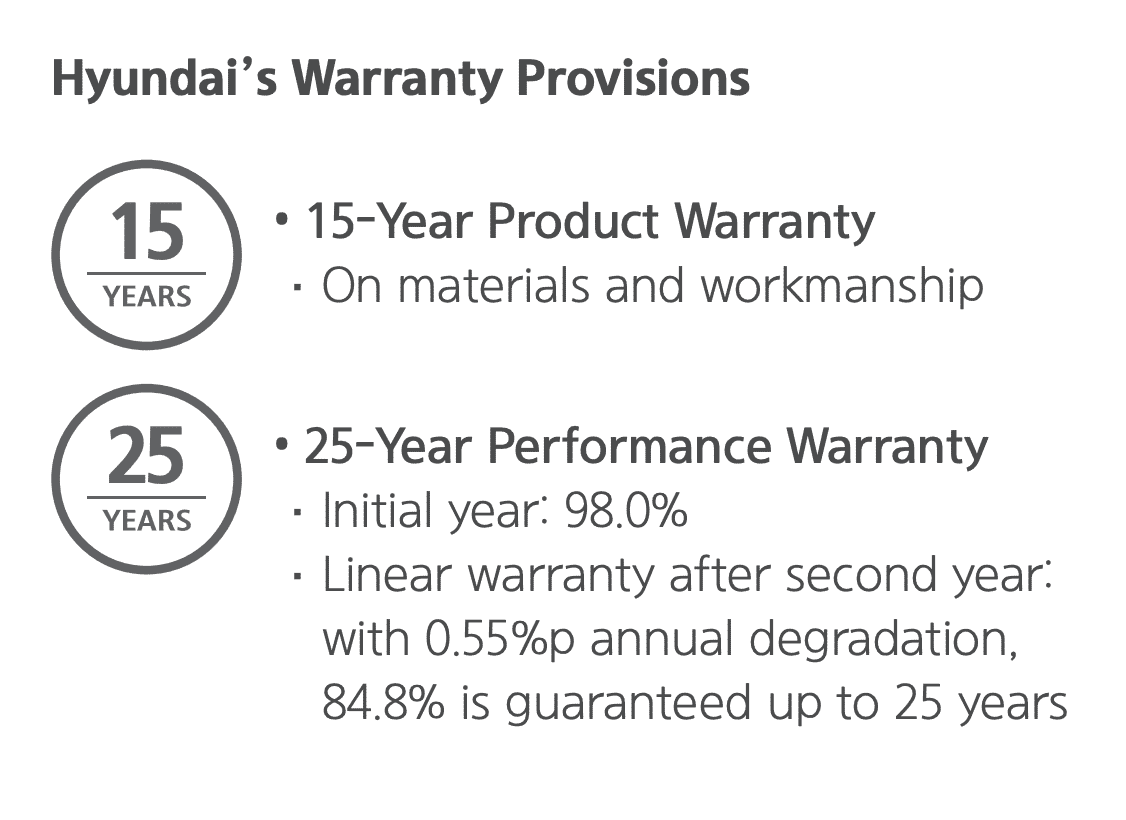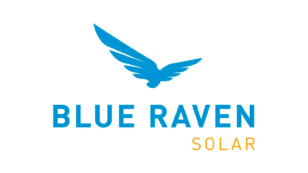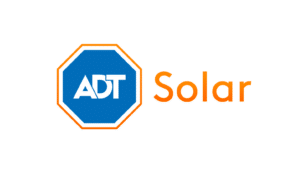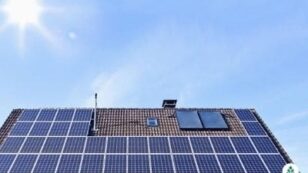

Hyundai Solar Panels Review (Cost, Ratings & Reviews in 2024)
Here’s what you need to know about Hyundai Solar:
- EcoWatch Rating: 4.5/5 Stars
- Efficiency: 19.6% to 20.6%
- Power Rating: 350 W to 410 W
- Warranty Length: 15 to 25 Years
Each product and or company featured here has been independently selected by the writer. You can learn more about our review methodology here. If you make a purchase using the links included, we may earn commission.
What is Hyundai Energy Solutions?
Hyundai Energy Solutions began operations in 2016 as a spinoff of its parent company Hyundai Heavy Industries.1 The Korean renewable energy company specializes in producing world-class photovoltaic (PV) equipment including cells, modules, energy storage devices like solar batteries and inverters.
This company is a titan. With an international reach and over $472 billion in total sales in 2024, Hyundai will continue to be a name heard commonly throughout the clean energy transition.2 Its solar power products can be found from rooftops in Kansas to the Hyundai Motors test center in Buk-gu, Korea.
Hyundai Energy Solutions might be best known for its work on utility-scale and commercial solar energy installations, but its residential products for both grid-tied and off-grid purposes live up to the same standard. In fact, its residential products compete with some of the solar industry’s biggest names like Tesla, Trina Solar, Qcells and Panasonic.
So how can you tell if Hyundai’s solar PV products are right for you? Let’s find out.
| Hyundai Energy Solutions Fast Facts | |
| Year Founded | 2016 (as spinoff from Hyundai Heavy Industries) |
| Headquarters | South Korea |
| Manufacturing Facilities | South Korea |
| Corporate Social Responsibility Report | 2024 Report |

Hyundai Solar

Average cost
Pros
- Power and efficiency among the best in the industry
- Excellent value for the price
- Stellar reputation
Cons
- Slightly limited options
- Limited warranty coverage
What Products Does Hyundai Energy Solutions Offer?
Hyundai offers a variety of solar products, but for the purposes of this article we’ll be sticking to its residential solar panels. Check out this quick video for an introduction to Hyundai’s products.
Hyundai XG Series
The XG Series from Hyundai is the smaller of the two it offers in 2024, but it’s also the more capable. These panels have an output of between 350 and 375 watts, and the efficiency rating reaches as high as 20.6%. This pales in comparison to Maxeon panels, which top out at 22.7%, but it’s still above average and should be plenty for most homeowners to offset or even eliminate their electric bills.
The company’s residential monocrystalline modules are high-quality, employing PERC (passivated emitter and rear contact) shingled technology to provide the high efficiency levels so crucial to residential installations. These high levels maximize the limited space associated with rooftop solar installations, as well as prioritize performance in low irradiation conditions (in other words, shade).
Hyundai’s XG series are sleek, all black, have no visible grid lines, are durable, corrosion-resistant and come with a comprehensive 25-year warranty for the equipment and performance. But more on that later.
Hyundai YH Series
The YH series of panels from Hyundai are a bit more capable in terms of output at between 400 and 410 watts, and the panels themselves are larger as well, so they might be less adaptable to installations on small roofs.
These panels have an efficiency rating just under the XG Series, topping out at 20.5%. This is still above the industry average of around 20%, but it can’t match the efficiency and output of higher-efficiency options, like Maxeon panels.
Much like the XG Series, the YH Series panels are all black and have no visible grid lines, so they look sleek and modern. They’re covered by the same 25-year warranty for the product and performance, which is outstanding.
Below we’ve compared characteristics of the XG and YH series models.
| Module | XG Series | YH Series |
| Wattage | 350–375 W | 400–410 W |
| Efficiency | Up to 20.6% | Up to 20.5% |
| Warranty | 25-year product and performance warranty | 25-year product and performance warranty |
| Temperature Coefficient | -0.36%/C | -0.347%/C |
Hyundai Solar Panel Efficiency
When it comes to residential solar system installations, efficiency is the name of the game. While power can be restricted by panel size, efficiency is what really sets the best solar panels apart from the pack.
On average, solar panel efficiency ranges between 18% and 20%, meaning that the panel successfully converts that percentage of sunlight into electricity.
Hyundai’s residential series boast efficiency levels averaging between 20.5% and 20.6% — a very strong figure for the clean energy company.
It reaches this level through its design that avoids light-induced degradation and potential induced degradation (PID). In simple terms, Hyundai’s panels are more advanced than the average panel when it comes to eliminating unnecessary energy loss.

Hyundai Solar Panel Power Rating
A solar panel’s power rating is perhaps the easiest performance criteria to understand — how much raw power is a module capable of producing at one time? The larger the power rating, the greater the capacity of your solar array.
The sizes of solar arrays are measured by the total capacity. For example, a 6 kW (kilowatt) system would be comprised of 20 300 W (watt) panels (300 x 20 = 6,000 W).
The industry average for power is 350-450 W. The very best residential solar panels on the market are just starting to reach levels over 450 W.
Hyundai’s solar modules have power ratings ranging from 350 W to 410 W — more than enough power to get the job done.
Hyundai Solar Panel Temperature Coefficient
Solar panels are intentionally placed in locations exposed to the elements. The more exposure to direct sunlight, the better. This can create issues in extreme heat conditions, as any electrical equipment’s performance will suffer if it overheats.
This is where temperature coefficient comes into play. Essentially, it measures the amount that a solar panel’s performance suffers in extreme temperatures. Panels with better performance will have smaller temperature coefficients (meaning less change in performance with temperature increase).
Hyundai’s XG series has a temperature coefficient of -0.36%/C, and the YH series has an even better temperature coefficient of -0.347%/C. These are strong figures given that the average temperature coefficient of modern solar modules ranges between -0.3%/C and -0.5%/C.
Hyundai Solar Panel Warranty

A lot of our readers assume that any warranties come from solar installation companies, but that’s not the case. Although warranties from your installer are an important aspect of your panel installation, the warranty that comes from the solar panel manufacturer is just as important if not more so.
Quality solar panels will carry product warranties of at least 10 years, while the very best will also come with 25-year performance warranties (also referred to as output protection guarantees). Hyundai covers both the equipment and the performance of its panels for 25 years, which is outstanding.
The performance warranty of your solar panels may be the most important consideration. With a linear warranty, you’re protected from solar panels diminishing in power and output, as electronics tend to do, over the course of several decades.
Hyundai guarantees with this warranty that your solar panels will still produce at least 84.8% of their original output by their 25th year of life.
How Much Do Hyundai Solar Panels Cost?
The price of solar panels can fluctuate so much across countries, states and even installation companies due to transportation costs and rebates available in various regions. For this reason, it’s hard to estimate the exact cost of Hyundai’s solar panels.
However, Hyundai’s solar panels are known for being very cost-effective given their above- average power and efficiency. We’d expect Hyundai to land in the medium price bracket for the average reader — equating to $26,600-$33,300 for an average-sized installation before the solar tax credit or $18,600–$23,300 after the credit is applied. For panels as efficient and powerful as the VG series, that’s a great deal.
Hyundai Solar Panels Pros & Cons
Every solar panel manufacturer has its pros and cons. Evaluating them can make it easier for you to figure out which brand is best for your energy goals.
Hyundai Solar Pros
- Power and efficiency among the best in the industry
- Excellent value for the price
- Stellar reputation
- All-black, sleek, modern panels
Hyundai Solar Cons
- Limited panel options
Are Hyundai Solar Panels Worth it in 2024?
Hyundai’s solar panels provide just about everything a homeowner could need — high power, great efficiency, durability and aesthetics — without having to pay more than the industry average.
There aren’t many downsides to choosing Hyundai. The only real drawback is that you only have two panel options for residential installation, but this is such a minor point in the grand scheme of things.
A second would only apply to our readers in the United States — by choosing Hyundai you miss out on the opportunity to support the U.S. economy and businesses.
That being said, Hyundai’s PV modules are a solid purchase for any home or business owner looking to support global clean energy efforts.
The cost information presented in this article is derived from a comprehensive analysis, incorporating data from multiple industry sources. The average cost per watt per state was calculated based on figures from Consumer Affairs, Energy Sage, and Berkeley Lab’s Electricity Markets & Policy Department. Additionally, monthly energy consumption and the average monthly cost of electricity were sourced from the U.S. Energy Information Administration, ensuring a well-rounded and accurate representation of the information presented.
More Solar Panel Providers
- Mission Solar Panels Review
- REC Solar Panels Review
- Solaria Solar Panels Review
- Most Efficient Solar Panels of 2022
- Tesla Solar Roof Review (Is It The Best Option)
- Guide to JA Solar Panels
- BP Solar Panels Guide (Cost, Ratings & More)
- Kyocera Solar Panels Reviews and Ratings
- Sun Badger Solar (Reviews, Services & More)

 233k
233k  41k
41k  Subscribe
Subscribe 





